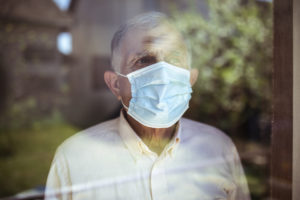Offering Emotional First Aid to Your Patients During the COVID19 Pandemic
Posted by Anthony Rostain, MD, MA on July 1, 2020

Since the onset of the COVID19 pandemic, Americans have been faced with unforeseen and unprecedented challenges that are provoking a host of stress responses. The magnitude of the disruptions to daily life are difficult enough for most people to cope with. What’s even harder for many is the extent to which uncertainty about the future has become a pervasive feature of our world. And while steps are being taken to reopen businesses, parks, public spaces and houses of worship, the continuing threat of contracting coronavirus poses ongoing dilemmas for providers and patients regarding ways to safely return to a “new normal.” Moreover, there is growing recognition of the toll this prolonged crisis is taking on the mental health of our population. Health care providers can play an important role in assisting patients to take stock of their level of psychological stress/distress and to support them to find suitable strategies for dealing with it.
To start with, it’s important to acknowledge that everyone is feeling stressed by COVID19 and to inquire how your patient is feeling about the pandemic. Are they worrying excessively? Are they having trouble managing their daily lives? Are they moving into the range of distress? It’s helpful to inquire about the following common signs of distress:
- Feelings of numbness, disbelief, anxiety or fear.
- Changes in appetite, energy, and activity levels.
- Difficulty concentrating.
- Difficulty sleeping or nightmares and upsetting thoughts and images.
- Physical reactions, such as headaches, body pains, stomach problems, and skin rashes.
- Worsening of chronic health problems.
- Anger or short temper.
- Increased use of alcohol, tobacco, or other drugs.
If your patient acknowledges experiencing more than one or two of these, and if these are interfering with their daily functioning, it can be helpful to validate their distress by saying something like, “I can see you’re struggling. Would you like to discuss some ways to reduce your stress level?” If the patient agrees, this is an opportunity to introduce some self-help ideas that can improve their state of mind. Among these are (1) taking care of your body (diet, exercise and sleep), (2) practicing mindfulness techniques (breathing, listening to soothing music) (3) connecting with others, and (4) staying informed and (5) limiting the amount of media exposure. It is important that patients understand that you are concerned about their emotional health and want them to get help if they are feeling overwhelmed or depressed.
The CDC has helpful handouts of tips for dealing with social distancing, quarantine and isolation (https://store.samhsa.gov/sites/default/files/product_thumbnails/PEP20-01-01-007%20-%20Thumbnail.jpg) and for coping with a disaster or traumatic event https://emergency.cdc.gov/coping/pdf/Coping_with_Disaster.pdf
